Building a platform for future success: Insights from Ceridian’s 2021 Pulse of Talent survey
Ceridian’s 2021 Pulse of Talent report examines what employees want and need in this new world of work created by the pandemic. The research was conducted last summer, with over 5,000 respondents taking part from Canada, the US, the UK, Australia and New Zealand. And it offers some useful insights for employers to reflect on.
While it might be assumed the crisis has resulted in a market tipped more in the employer’s favor, it appears to be more nuanced than that. 67% of respondents are open to moving on for a new opportunity: 37% are actively looking and 30% would consider one if approached. If employers want to both attract and retain the best talent out there, and enable employees to work to their full potential, they really need to understand what’s making today’s employees tick and respond accordingly.
Creating and building meaningful trusting relationships
Overall, employees had a fairly positive view of how well their employer was managing the pandemic crisis. Three quarters were happy with their employers’ responses. 72% felt they were well communicated with, and that their employer had done everything they reasonably could to keep them employed. 75% believed their employer had put suitable precautions in place to keep all employees safe.
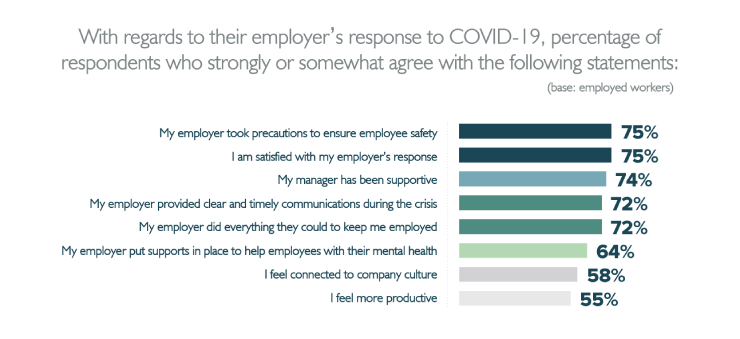
The more positively employees viewed their employers’ handling of the pandemic, the higher the overall level of trust and confidence in them too. 85% of the respondents who were positive about employer response were also positive about the likely success of the company longer term. In contrast, only 34% of the employees who were more negative about their company’s pandemic response were upbeat about its future.
The responses suggest that issues like culture and mental health continue to need attention – not surprising given the turmoil employees have had to cope with, along with organizations suddenly facing the challenge of needing to quickly adapt to managing culture remotely.
Leading with purpose
The past months have certainly called for empathetic and purposeful leadership. So how have organizations responded?
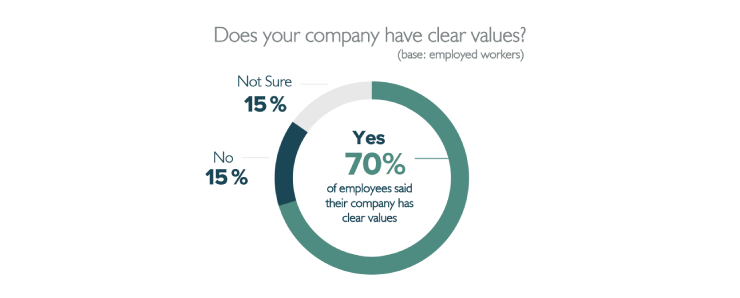
Almost three quarters (70%) of employees believe their company has clear values, vital for forming and guiding an overall sense of purpose.
And yet there seems to be a disconnect. 55% of employees believe their senior leaders bring those values to life in the way they act. But that leaves a significant proportion of employees that don’t think their leaders are acting in ways that are consistent with the values.
That could potentially erode trust. It can limit purposeful action and damage efforts to move forward towards shared goals. Longer-term, it can negatively affect the culture. Within the respondent group there was a subsection of employees thinking about moving due to a lack of belief in their company’s longevity. The top reason behind this lack of faith in longevity was a lack of confidence in leadership team capabilities (33%). Employees must feel they can trust their leaders. That’s partly achieved through witnessing authentic behavior, where leaders act in line with the values they ask others to bring to life too.
A more individualised approach
Comparisons against similar research from 2018 show a decline in satisfaction in a number of areas including benefits and workplace perks. What can employers do to address this?
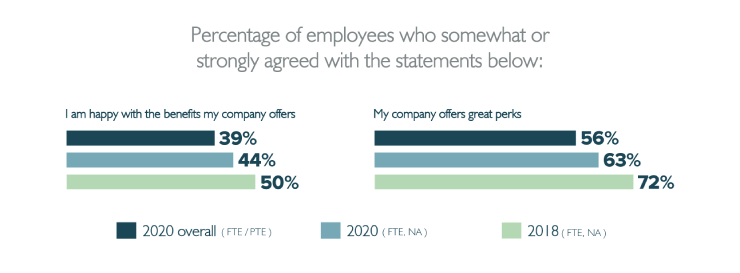
“One size doesn’t fit all” is the message coming through with more individualized approaches required to address employee needs effectively. The report suggests that employee experience strategies must accommodate personal situations as far as possible. Companies must listen properly to really understand what will help individual employees flourish.
Employees seek flexibility and growth
Remote working is something that’s desirable for many employees – but as this report suggests, flexibility goes beyond that.
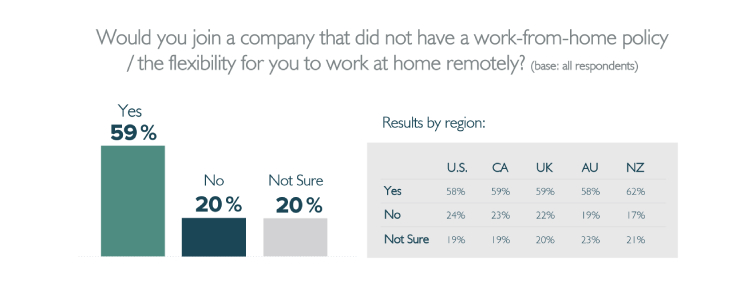
For a significant proportion of the respondent group, remote working isn’t something available to them, often due to the nature of their work. 59% would still consider working for an organization that didn’t offer a working from home policy. For nearly a third of that group, that was due to the fact that they worked in an industry or had the type of job where they needed to be present in a specific workplace. 28% felt remote working wasn’t particularly important to them anyway.
But flexibility extends beyond allowing remote working. It’s about enabling employees to achieve a better work-life balance in whatever way suits them and their employer best. Where it gets done is one consideration. But how it gets done, who is doing it and how it’s structured is as relevant too. The research also indicates the importance attached to being able to take on new challenges. Despite all of the upheaval created by the pandemic, more than one in three respondents would consider leaving their current organization with the top two drivers being to take on fresh challenges (30%) and to seek the right career opportunities (28%).
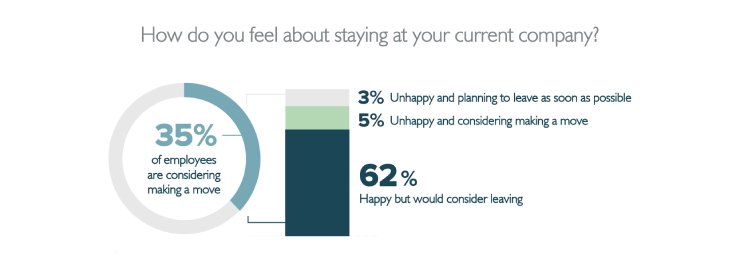
This kind of growth doesn’t necessarily mean an upward move, however. A third of all respondents would make a lateral move and even accept less pay to take on a growth opportunity. It’s more about job experiences rather than positions held.
There are opportunities for employers to become more closely involved with employee aspirations for personal growth. Employers could be thinking in terms of job rotation, projects, mentoring, coaching and volunteering assignments. 77% of respondents want employers to provide learning opportunities. 34% of employees will be looking to their employers to provide training programmes over the next five years. Another 34% intend to learn independently. Provision of programmes coupled with providing working time and space to undertake and reflect on self-directed learning could be another way for employers to meet employee aspirations.
Laying the foundations for the post-pandemic workplace
Employer responses to the pandemic have helped to develop trust. That can be built on with greater leadership consistency between values and actions. It can be further supported by giving employees more individualized experiences and growth opportunities that address their personal preferences and needs.
Read more: What will the post-pandemic workplace look like?
Once this might have sounded unachievable. But the technology is there to create the infrastructure to help this to happen. It enables companies to hear employee views about their needs. It can provide specific and real-time insights into different employee circumstances. Those insights give employers the opportunity to respond effectively which, when combined with consistent leadership and line management, offer the potential to shape the foundations for long-term success.


 How Machias Savings Bank improved employee satisfaction and increased commitment to company values
How Machias Savings Bank improved employee satisfaction and increased commitment to company values
 Great managers vs natural leaders: What’s the difference (and does it matter?)
Great managers vs natural leaders: What’s the difference (and does it matter?)
 Workstars now integrates seamlessly with the HRIS you use every day
Workstars now integrates seamlessly with the HRIS you use every day